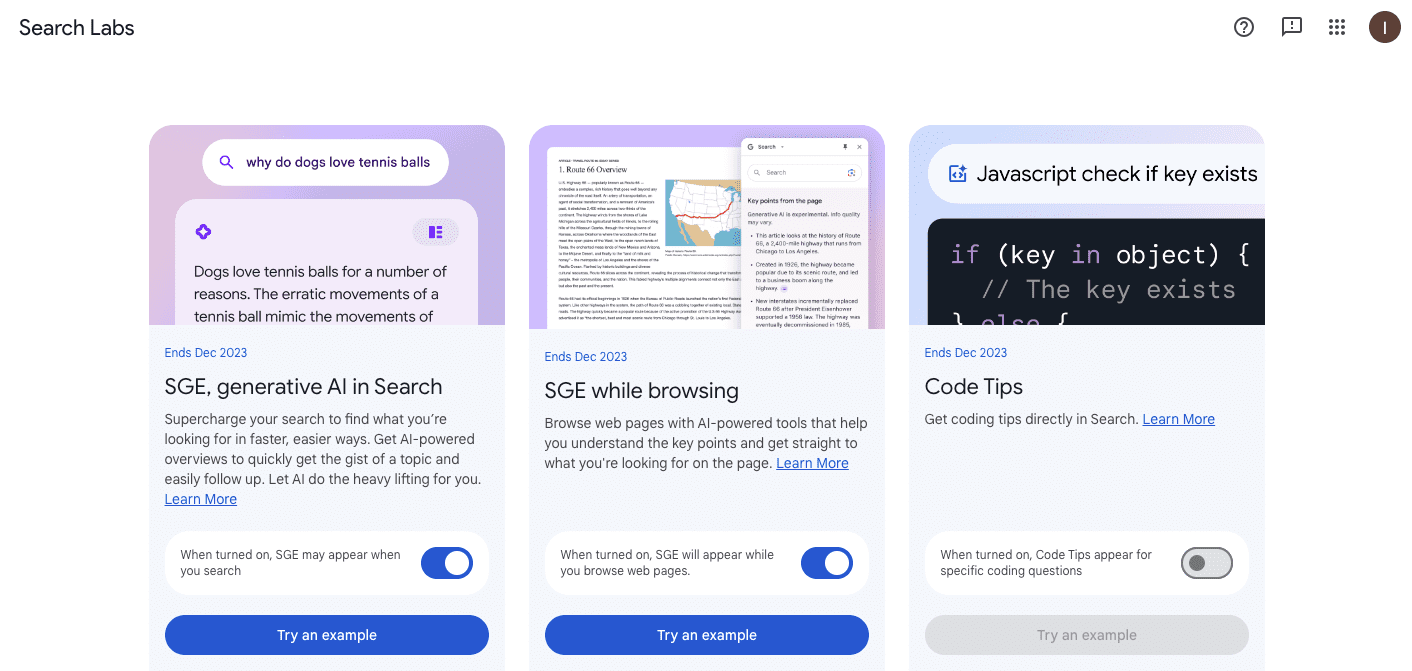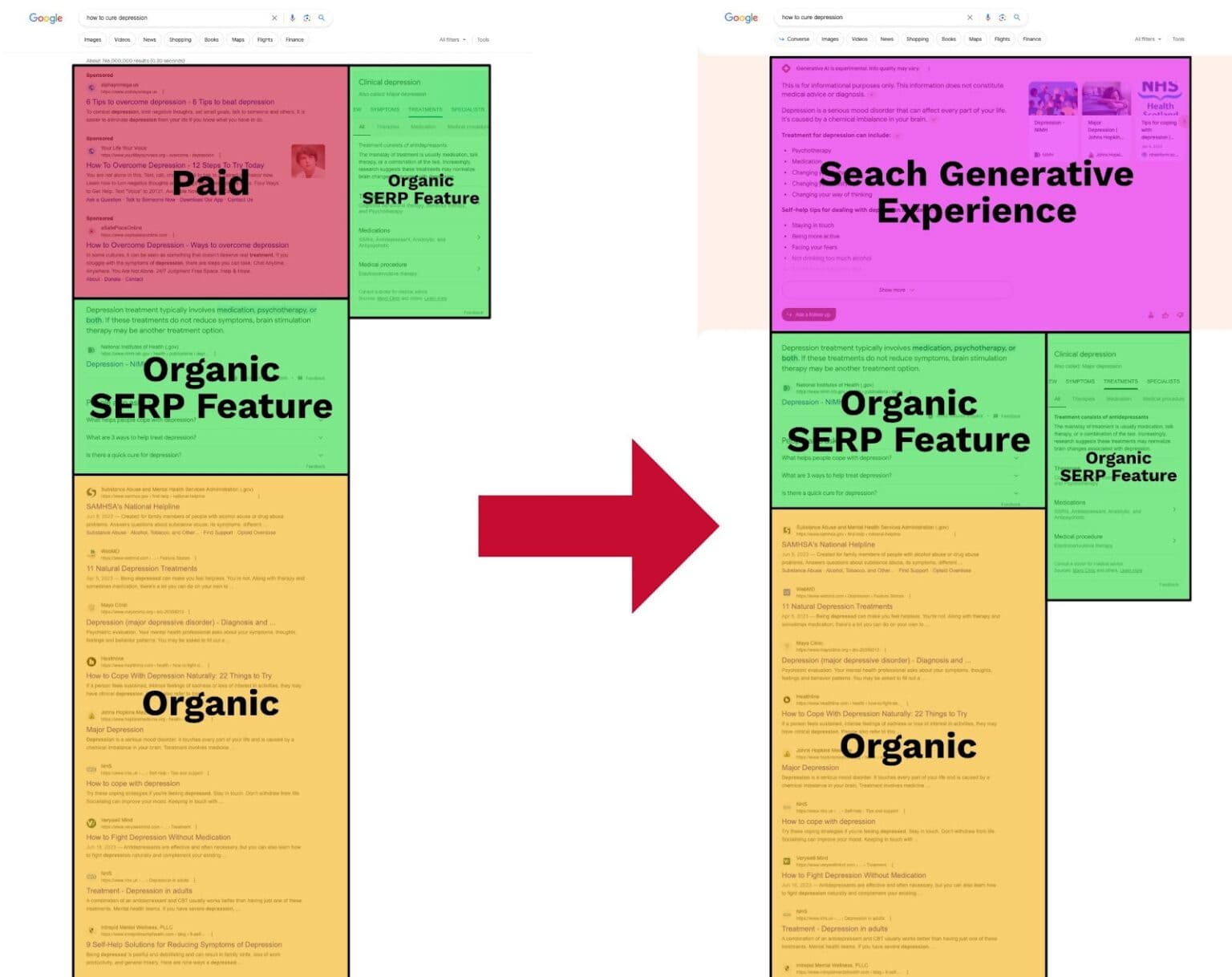The SEO Industry in the Age of AI and SGE: What to Expect from Generative AI in SEO
Ever since AI started pervading nearly all industries, there have been heated debates about how it will affect and transform said industries. One particular field where AI has ruffled the waters is search engine optimization (SEO) and the search experience.
After the major search engines, Google, Microsoft, Baidu, and DuckDuckGo, introduced Search Generative Experience (SGE) - a search experience that relies on generative AI to serve AI-generated answers in response to user queries, experts are wondering how it will affect SEO and search results.
Although SGE has revolutionized the user experience, it has also significantly impacted the SEO landscape, both positive and negative. In this article, we will explore how Search Generative Experience will affect the SEO industry and organic traffic.
SGE will reduce the need for users to visit websites
When a user is using SGE, they get an AI-powered overview, giving a generated answer to their query. If previously, you had to visit a couple of websites to get information, Google AI or Bing AI will surface an AI-generated response at the top of the result page.
This way, SGE eliminates the need for users to click through several websites. Of course, not all queries can be answered with an AI-generated overview; some may still require users to visit websites, for example, in navigational and transactional queries.
Currently, SGE is still in the experimental stage. But as AI-generated responses improve, users could skip the task of browsing through numerous search results and instead rely on AI-generated answers to their queries, saving them time and effort.
 Image credit: Google Search Labs
Image credit: Google Search Labs
Decreased click-through rates and organic traffic
As a result of users not visiting websites, the click-through rate and organic traffic will decline. Search Engine Land predicted an organic traffic decline of 30%, a drop similar to when Featured snippets were introduced.
This shift in SGE will likely result in zero-click searches where users will just get the answer in the SERPs.
🔎 📈 You might also like to read: ChatGPT for SEO: Can ChatGPT Replace Traditional Content Optimization?
Sources featured in SGE results are not necessarily in the top 3 organic results
However, the AI overview also features sources from which the information was taken. Based on SEL observations, it usually displays 3 sources on the right of the generated overview, with small dropdown arrows on which users can click to expand.
The exciting and unexpected update regarding the sources chosen in the SGE is that they don’t always match the top 3 organic sources in organic results. So, your page might have surfaced in the AI review for a query that previously hadn’t been featured in the top 3 results.
SGE will disrupt paid search and search engine marketing (and give rise to new monetization models)
One of the aspects that Search Generative Experience will have the biggest impact on is paid search and search engine marketing, i.e., websites monetizing from ads and affiliate marketing.
SGE takes up a lot of SERP real estate. Therefore, Google had to make readjustments to how they show results to make room for the AI overview.
Additionally, search engines make money by monetizing online search services, taking a share of the money websites spend on enhancing their online visibility through paid ads, affiliate marketing, and other techniques.
As search engines are increasingly moving towards zero-click search with the new SGE shift, the whole search engine marketing is at risk of becoming obsolete, explains Ravi Sen for Fortune.
That being said, Google and other search engines wouldn’t want to forsake the sweet revenue coming from ads and paid search (In 2022, Google Ads accounted for nearly $162.5 billion of Google's revenues, which is around 58% of their total revenue.
For the time being, paid ads still appear at the top of the SERP, and they are expected to remain there. Searchers will continue to see paid ads before they see the organic search results and the AI-generated text.
There’s yet to be seen what kind of monetization strategies search engines will develop around the SGE.
 Image credits: Search Engine Land
Image credits: Search Engine Land
E-commerce sites may be positively affected by product images in AI overview
Opposite to informational sites expected to see a significant drop in organic traffic and click-through rate, e-commerce queries related to products will experience a significant surge, with product images prominently showcased in SGE.
Also, having outstanding product images will positively impact CTR if products appear in the cited sources in the AI overview, just like a captivating YouTube thumbnail. Consequently, e-commerce sites would be strategic in creating attractive product images that will increase their chances of being displayed in SGE and encourage users to click on them.
With AI overviews in search, image optimization becomes more important than ever for your visibility.
You want to learn how to use ChatGPT for SEO? 🌟 Check out 30+ ChatGPT prompts for SEO.
There are still many unknowns about SGE
Despite the many changes taking place after the introduction of the Search Generative Experience in search engines, there are still many unknowns surrounding it.
So far, the SGE results are volatile, meaning the AI-generated results are drastically different just a week or a month apart. At first, the SGE results were displayed as a whole section, but then Google introduced a small preview and a ‘Show More’ button that doesn’t fill the entire above-the-fold part.
Additionally, we still don’t know if SEOs will get access to official SGE data in Google Search Console. Bing introduced Bing Chat data in Bing Webmaster Tools, but the data is not satisfactory.
And more importantly, no one knows for certain how you can optimize your page to appear in the SGE.
One thing is certain - as generative AI search engines are still in the experimental stage and available to certain test groups, they still don’t dominate the search landscape. There are a lot of challenges they need to overcome and questions to answer before they gain trust and dominance in SERPs.
As an SEO expert, the best thing you can do is focus on actions with immediate SEO impact rather than becoming overly fixated on SGE-related solutions. Working on known impactful strategies, optimizing content, and monitoring keywords are still best practices to follow, while the long-term impact of SGE remains uncertain.
-(2)-profile_picture.jpg)
